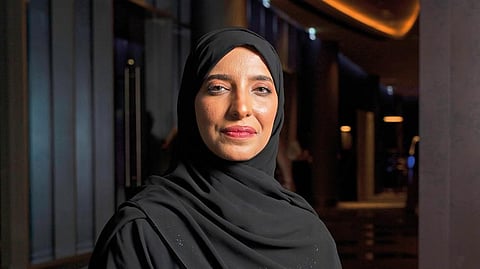Modern game changers: Dr Fatma Al Ma’Mari, experimental physicist
Dr Al Ma’Mari’s research on spintronics has practical benefits on the day-to-day gadgets we use, while helping cut down on environmental damage caused by mining of rare minerals

Think trailblazing scientists and Isaac Newton, Albert Einstein and Stephen Hawking spring to mind immediately. How often does Polish-French scientist Marie Curie make that list? The sad truth is, rarely. It’s this narrative the L’Oreal-Unesco For Women in Science programme is trying to change since 1998. ‘The initiative has supported over 3,200 women, rewarded 107 laureates (three have since won Nobel Prizes), granted fellowships in 118 countries till date,’ says Remi Chadapaux, managing director of L’Oreal Middle East. The Middle East Fellowship, now in its sixth year, has been putting female Arab scientists on the global map.
This article is part of series where we speak to three current fellows (announced earlier this month) and three past ones of the Middle East Fellowship.
Also in this series:
- Modern game changers: molecular biologist Wafaa Ramadan
- Modern game changers: Dr Habiba AlSafar, pioneer in genetics
- Modern game changers: Dr Saba Al Heialy, uncovering links between obesity and asthma
- Modern game changers: Dr Maha Al Mozaini, overcoming cultural taboo in HIV research
- Modern game changers: Dr Wafa Audah Altalhi, futuristic research on bioengineered organs
Dr Fatma Al Ma’Mari, assistant professor of physics, Dr Sultan Qaboos University, Oman, and present recipient of L’Oreal-Unesco For Women in Science Fellowship
Walter Lewin, the Dutch astrophysicist and former professor of physics at MIT, famously said, ‘teachers who make physics boring are criminals.’
Talking to Dr Fatma Al Ma’Mari, it’s clear she has the ability to make the subject a pleasure to study. The experimental physicist from Oman, a winner of the 2019 L’Oreal-Unesco For Women in Science Fellowship, is a product of the enthusiasm, awe and passion that educators instilled in her.
‘Educational institutions are vital to promoting pure sciences like physics because they’re often someone’s first influence. You can grow up hating or liking something in school and especially if you’re a girl, it’s important.’
Dr Al Ma’Mari luckily had an inspiring physics teacher in school who made her feel physics was her wheelhouse. ‘What I enjoy about physics is that it isn’t always book-learning, and solving equations. It’s about problem-solving.’
The problem that Dr Al Ma’Mari hopes to solve is creating new sustainable magnetic materials that can replace rare earth materials such as neodymium and dysprosium that are traditionally used to make permanent magnets – it’s the research question that won her this year’s fellowship.
If she manages to develop eco-friendly carbon-based magnets, her research will become part of our everyday lives. ‘My work focuses on the branch of magnetism called spintronics, where the spinning movement of electrons is used for electronics.’ She pauses a beat before explaining with a laugh: ‘Spintronics are used in your laptop, and smartphone, any clicks you make, and you’re moving the spin of electrons.’
Dr Al Ma’Mari is used to having to go the extra mile to explain and interest people in her work, unlike her medical counterparts and researchers in healthcare whose work people immediately relate to.
‘But if you can explain the [practical] uses of your research, it gets them hooked,’ she adds. Winning the L’O’real fellowship has given her a platform to get people to know about her work and receive funding (she gets about Dh80,000), which is essential for experiment-heavy research like hers that would otherwise grind to a halt even before it takes off.
‘I’m building things from scratch some days, and making sample [materials] is a bit like baking a cake. You need to put in all the ingredients and make adjustments to get a final product that’s just right. With my research, I have to then check if these elements work together by using certain machines and devices.’
Dr Al Ma’Mari’s research has benefits that extend beyond improved day-to-day gadgets and cutting down on environmental damage caused by rare minerals’ mining. She hopes her research on carbon-based magnets would cut costs on production of electrical motors used in renewable energy, hence having a great impact in the Middle East when the region runs out of oil.
Unlike the field of physics, where opportunities never run out.
‘There is no end to what you can do with physics,’ she says. ‘We use it everywhere from solar cells to nanoparticles used to destroy cancer cells in medicine, to simple everyday electronics.’
So any fears about being rendered unemployable after graduating in physics can be put aside. It was one of Dr Al Ma’Mari’s family’s main concerns but they’ve been allayed by the success she’s been having.
She’s not oblivious to the fact that the number of women who pursue pure sciences such as physics or mathematics are far and few compared to those who opt for medical research. At physics conferences abroad, Dr Al Ma’Mari finds herself to be the only Arab woman present.
The one thing she feels can turn the tables for women in physics is more female role models – something she didn’t have much of growing up. Dr Al Ma’Mari hopes to be that beacon for the next generation of female physicists in the region through her role as assistant professor at Sultan Qaboos University. ‘At the end of the semester I have groups of girls who come and thank me for making them like physics.’




